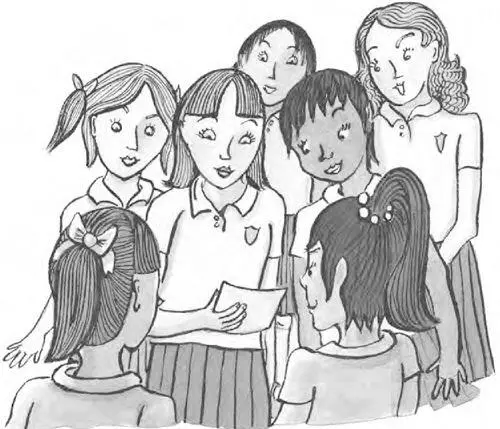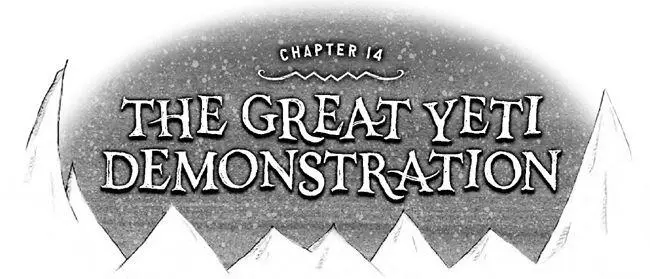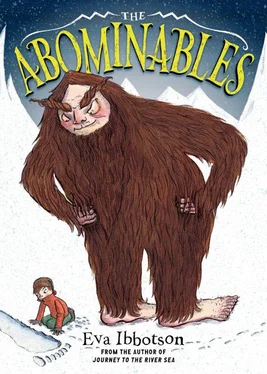
Next Ellen visited a ballet school, where the girls were doing pliés at the barre, and managed to get past a whistle-blowing games mistress to tackle some cold-looking high school girls stripping for gym, before she met Con again at Newlands Progressive. This was rather an alarming place: very new and fashionable with lots of glass and sculptures in the hall, and the children all seemed to come from very trendy homes. But they were certainly very quick on the uptake when it came to what they called protest. “We’re not protesting,” said Con, “we’re asking for help.”
“Of course you’re protesting,” said a boy of about twelve in bare feet and an Indian shirt. “You’re protesting against blood sports.”
Con had to agree with this. “But we want to keep it orderly.”
“Oh, sure,” said the boy. “Trouble with the law is just a waste of time.”
The teacher came back then — Ellen thought him a bit shaggy for a teacher — but he listened to them, which was more than could be said for some of the others they had met. “This might be a good opportunity for a lesson in practical citizenship,” he said. It was an odd place, Newlands Progressive.
The whole morning, Con and Ellen never stopped to rest or eat as they pounded through the streets of London. They begrudged even the seconds that it took to retie their shoelaces.
Convent schools and prep schools, strict schools and sloppy schools, schools for maladjusted children and schools for little snobs … Jewish schools and French schools and schools for the Deaf, schools run by bullies and schools run by kind and enlightened head teachers — that grueling morning, Con and Ellen visited as many as they possibly could. But London is a big city, and there are a lot of schools. They may have broken some kind of record, but they couldn’t visit them all.
And by two o’clock, half-dead with fatigue, they sat on the steps of the Victoria Monument in the middle of the huge area that faces the Queen’s London home. They had bought a couple of meat pies and a banana and as they munched and rubbed their aching feet, they knew they had done everything they could. There was nothing to do now except wait.
Chapter 14
The Great Yeti Demonstration

 O ONE’S GOING TO COME,” SAID CON SUDDENLY,in a flat, bleak voice. “We were mad to think they would. It’s all been a complete failure.”
O ONE’S GOING TO COME,” SAID CON SUDDENLY,in a flat, bleak voice. “We were mad to think they would. It’s all been a complete failure.”
“It’s only half past two,” said Ellen. “Remember, the schoolchildren have got to get out of their schools somehow. That isn’t exactly easy. And people have jobs …”
Another five minutes, ten …
Con heard a polite cough, and, turning round, he saw an elderly couple smiling at him. “Have we come to the right place for the yeti demonstration?” asked the man.
“Our friend Margaret told us about it,” said the woman. “She couldn’t come herself; she really can’t get about much. But we’ve brought a Thermos and a folding chair for Charles. His knees, you know.”
Con said that they had come to the right place, and they set about arranging their chair and getting comfy.
Some more minutes passed.
And then, walking in a neat line down the Mall, their banner torn from Sister Theresa’s bathrobe waving in the breeze, came the little white-bloused girls of the Sacred Heart Convent. Without fuss, taking no notice of the amused stares of the passersby and the tourists with their cameras, they bowed their heads to Con and Ellen and then went to stand in a row in front of the tall spiked railings, facing the silent sentries of the Coldstream Guards.
They had hardly got settled when, swinging across St. James’s Park, came a motley, long-haired crowd of boys and girls from Newlands Progressive. They had raided the art room for posters, and the slogans they carried, though not always spelled quite right, were brightly painted and eye-catching. A FARE DEEL FOR YETIS, said one placard and AKTION NOW! said another. They had been singing “We Shall Overcome,” accompanied by their teacher on a mandolin, as they straggled across the park, but when they reached the palace, they became quiet immediately and went to stand behind the little girls of the convent, their banners pointing so that the Queen could see them.
Then a strange collection of people came shuffling across the road toward the palace. Ellen recognized the homeless man with his little dog who had shouted at her the night before. He had brought some friends with him. It was clear from their appearance that they lacked most of the necessities of life, such as hot water, beds, and teeth, but they were in good spirits. Perhaps a bit too good, some of them, thought Ellen. They gathered at the railings and struck up a conversation with the elderly couple. At first the old gentleman on his folding chair was a bit put out, but the dog soon put an end to that. He wagged his tail politely, and Con saw the old man reach out to scratch him behind the ear. “It hasn’t been the same since Buster went,” he sighed. “Can’t get another dog now. He’d outlive me.”
And now people began to appear from everywhere. The children of Bermeyside Primary came up Buckingham Palace Road and went to stand beside the Newlands Progressive students. The boys of the cricket-playing prep school, in striped caps that made them look like little wasps, marched proudly up Constitution Hill and came to a halt beside the convent girls. Ellen’s ballet students, moving already with the grace of dancers, came in across Green Park.
And so they came. Slowly but surely the trickle became a stream, and the stream a river. There were children from schools that neither Con nor Ellen had had time to visit — and schools that Leo had called out from the northwest of London where he lived. And there were university students who should have been at lectures and nannies pushing prams containing babies whose own parents were too rich to look after them. There were mothers and workmen and pensioners.
They had done it. The traffic had stopped and there were long lines of cars with puzzled people in them, hooting. Policemen appeared, looking baffled — was it some kind of rally they hadn’t been told about? So many children — and where were the teachers?
“Come along, move along,” they said. And people did come along and did move along, but always, quietly and obstinately, to the place they had been told to come, the great circular space outside the stately gray palace of the Queen.
There were perhaps a thousand people there by three o’clock. But an odd thing about crowds is that a thousand isn’t very many. Of course, in a railway station or a theater it is a lot. But not in a huge wide concourse like the one in front of Buckingham Palace.
Con and Ellen had done their very best; no one could have done more. But you simply can’t get a million people to come to a demonstration in a single day.
And now as Con ran up the steps leading to the statue of Queen Victoria in the middle of Queen’s Gardens and looked out over the crowd, he couldn’t help thinking that although it was more than just a puddle of faces gazing up at him, it certainly wasn’t a sea.
He climbed the statue and raised his arms, and someone started chanting, “We want the Queen, we want the Queen!” Then others joined in, and soon they had all taken up the cry. Then Con lowered his arms, the crowd fell silent, and in his strongest voice, he spoke.
Читать дальше



 O ONE’S GOING TO COME,” SAID CON SUDDENLY,in a flat, bleak voice. “We were mad to think they would. It’s all been a complete failure.”
O ONE’S GOING TO COME,” SAID CON SUDDENLY,in a flat, bleak voice. “We were mad to think they would. It’s all been a complete failure.”










